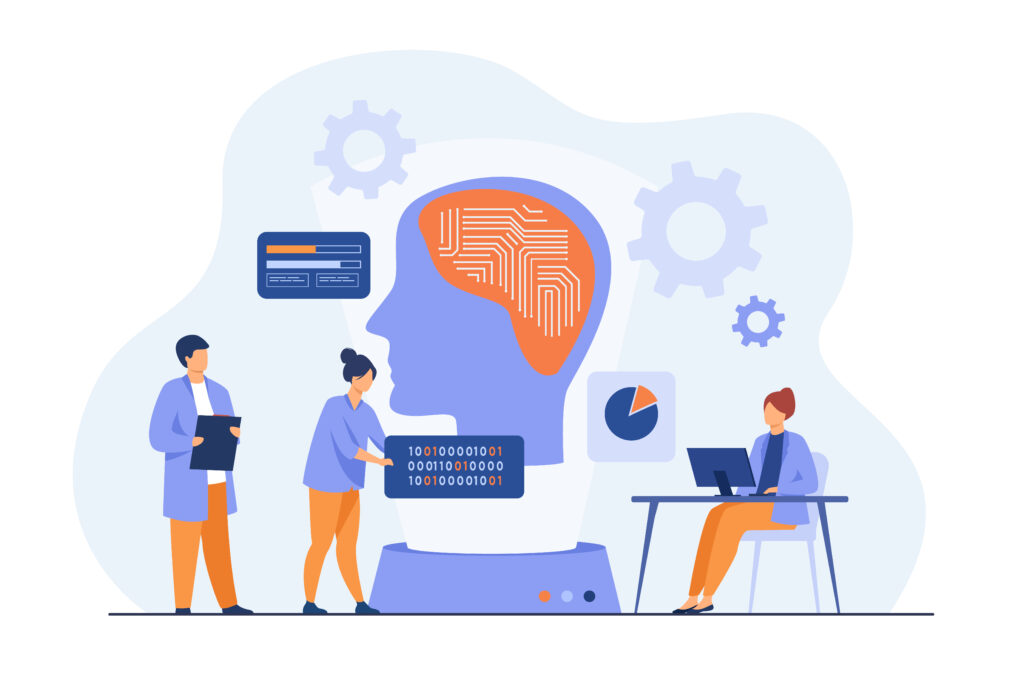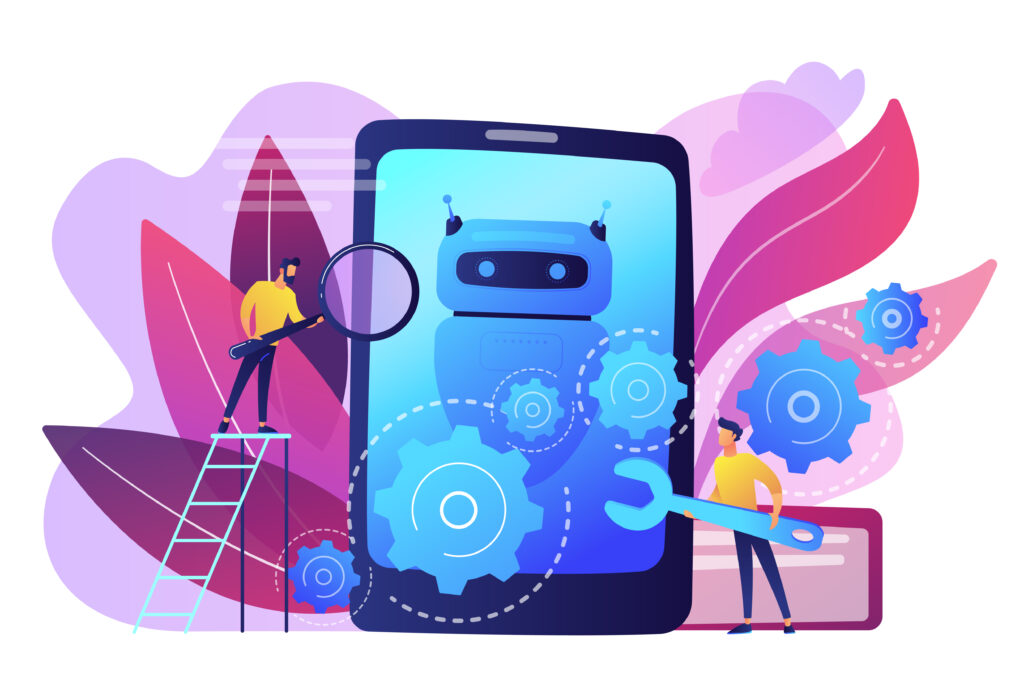Why You Should Explore the Benefits of AI Support
Although AI hasn’t reached the level of true artificial intelligence as it can’t completely replicate human thinking, the Benefits of AI Support are still remarkable. AI involves a set of algorithms designed to process large amounts of data at impressive speeds. By utilizing advanced techniques such as machine learning, deep learning, and neural networks, AI continuously refines and improves itself.

However, human input is essential to ensure the tools are trained with appropriate data and to prevent the introduction of any unintended biases. For businesses, AI offers an efficient and trustworthy method for managing and making use of the ever-expanding volumes of data coming from both customers and partners.
How Businesses Can Use AI
AI solutions for businesses cover a wide range of applications, from chatbots to advanced business intelligence tools. Organizations are adopting these technologies for various purposes, such as optimizing social media management and enhancing forecasting accuracy.
To tap into these benefits, businesses can partner with or subscribe to services offered by AI providers like OpenAI or IBM’s WatsonX. Additionally, several AI-powered platforms are available off-the-shelf from companies like HubSpot, Salesforce, and Tableau, among others.
For businesses with in-house development teams, there’s the option to create custom AI solutions tailored to specific needs. However, this requires skilled professionals with in-depth knowledge of AI, machine learning, and their influence on contemporary business operations.
How AI Benefits Businesses
Here are 7 more specific applications of AI that many businesses are utilizing today:
1 Enhanced Decision-Making
AI-enabled decision-making is both faster and more intelligent because it provides real-time data that leaders need. For instance, if a marketer wants to assess the progress of a campaign, AI can quickly reveal performance data, along with insights on market trends and external factors that could affect the campaign’s success. These insights allow leaders to make swift, data-driven decisions with confidence.
2 Boosted Efficiency and Productivity
AI enhances efficiency by automating repetitive tasks across various business processes. Tasks like data entry, which are time-consuming and prone to human error, can be automated. AI tools can automatically update information in related systems when a change is made.
AI can even convert handwritten documents into editable text, improving the accuracy and convenience for industries like healthcare that use electronic health records (EHR). By automating repetitive tasks, AI frees up employees to focus on more valuable work, improving overall productivity while saving time and reducing costs.
3 Improved Customer Experience
With AI, businesses can meet the 24/7 expectations of customers. Using natural language processing (NLP) and natural language generation (NLG), AI can power chatbots and automated emails to handle numerous customer inquiries. It can also provide real-time responses to social media comments and personalized email communication, delivering a more responsive and tailored customer experience.
4 Cost Savings
AI helps streamline business processes, reducing the need for manual intervention and driving cost savings. For example, in manufacturing, AI can enhance quality control by detecting patterns that human workers may miss. This leads to higher-quality products, fewer defects, and significant savings in production costs.
5 Risk Management
AI uses historical data to make accurate predictions, simplifying risk management by providing recommendations based purely on data. Unlike humans, AI can process vast amounts of data from multiple sources without bias. For industries like insurance, AI helps assess risks by predicting costs, claims, and customer behaviors.
6 Innovative Solutions
Generative AI helps businesses brainstorm and create innovative ideas. Analytical AI also plays a critical role in R&D by using vast amounts of data to identify trends and help companies create a competitive edge with perfectly matched products.
AI is opening new doors for solving challenging problems across industries, from fraud detection in banking to predictive maintenance in manufacturing.
7 Predictive Analytics
Predictive analytics is an advanced analytical approach that uses historical data, statistical algorithms, and machine learning to predict future outcomes. AI enhances this process by analyzing large datasets quickly, spotting patterns that human analysts might miss.
This allows businesses to predict trends, anticipate market shifts, and make confident, data-driven decisions. For example, retailers use AI to forecast inventory needs, optimizing stock levels, reducing excess inventory, and improving customer satisfaction.
8 AI Insights for Marketing
AI helps businesses create highly targeted marketing campaigns by analyzing consumer behavior, preferences, and trends. With AI, marketing strategies can be tailored to attract the right audience, optimize ad spend, and increase engagement, leading to improved business outcomes.
9 Streamlined Operations
AI speeds up various business operations, improving accuracy and reducing costs. For example, AI can optimize supply chain logistics and inventory management by forecasting demand and streamlining scheduling, helping businesses achieve their goals more reliably.
10 Better Data Security
With increasing cyber threats, AI has become vital in protecting data and systems. AI-powered security solutions continuously monitor networks for potential threats, identifying and stopping them in real time, helping businesses safeguard sensitive information and maintain customer trust.
11 Enhanced Recruitment and HR
AI accelerates the hiring process by automating candidate screening, minimizing biases, and identifying the best talent more effectively. AI can also predict employee retention, reducing turnover and fostering a better workplace culture.
12 AI for Financial Planning
AI improves financial forecasting by analyzing past data and identifying patterns, helping businesses make smarter investment decisions and allocate resources more effectively. This leads to better financial planning and budgeting.
13 Accelerated Product Development
AI enhances product development by identifying market trends, customer preferences, and competitor insights. Businesses can innovate faster, reduce development costs, and increase the chances of a successful product launch by aligning products with consumer needs.
14 Scalability and Flexibility
AI solutions offer scalability and flexibility, allowing businesses to grow without being constrained by rigid infrastructure. Whether managing a surge in customer inquiries or analyzing vast datasets, AI platforms can scale up or down as needed. Cloud-based AI solutions make scalability even easier by providing on-demand access to computing power without the need for expensive infrastructure.
What’s the Future of AI in Business?
AI in business is evolving rapidly, and as scalable solutions become more sophisticated, business leaders will need to innovate and rethink entire workflows. Developers with expertise in AI will be in high demand, particularly those who understand how to leverage AI for business success.

Some key trends shaping the future of AI in business include:
1 More Human-Like Language Generation
AI models are expected to become even more proficient in generating text that closely mirrors human-written content. This development will enhance customer service, content creation, and report generation by making automated interactions feel more natural and authentic.
2 Advanced Personalization
AI will drive increasingly personalized business marketing efforts, enabling companies to tailor content and campaigns based on individual customer preferences and behaviors. This deeper level of personalization will lead to better customer experiences and higher conversion rates.
3 Precision Microtargeting
AI-powered tools will allow marketers to create more granular audience segments, enabling microtargeting on a scale never before possible. By understanding customer needs at a finer level, businesses will be able to optimize marketing strategies for maximum return on investment.
4 Improved Predictive Analytics
AI will continue to enhance the accuracy and scope of predictive analytics, allowing businesses to make more reliable forecasts. This will improve long-term trend prediction, optimize supply chain logistics, better manage inventories, and streamline financial planning.
5 More AI-Driven Roles Across Industries
As AI becomes more integrated into business operations, an increasing number of roles will require proficiency in these technologies. This will drive the need for continuous training and upskilling, ensuring that teams can effectively utilize AI to boost productivity and efficiency.
Importantly, AI isn’t about replacing humans it’s about augmenting their abilities with the right data and tools, enabling them to perform their roles more effectively and efficiently.
Challenges of Implementing AI in Business
While AI has the potential to transform business operations, there are several hurdles that need to be addressed for its successful integration.

High Implementation Costs
One of the biggest challenges is the significant cost associated with implementing AI. Many AI tools and platforms require substantial upfront investments in software, infrastructure, and skilled personnel. This can be a major obstacle for startups or smaller companies looking to begin their digital transformation.
Data Requirements
AI systems rely on large, high-quality data sets to function effectively, which requires strong data collection, storage, and management practices. Managing the data needed for AI can be complex and time-consuming, posing a challenge for businesses that lack the proper resources or systems.
Shortage of Skilled Talent
Another major barrier is the shortage of skilled professionals in AI and data science. As demand grows for AI expertise, finding experienced individuals to develop, maintain, and optimize AI systems has become increasingly difficult. This skills gap can hinder the successful deployment of AI within organizations.
Data Privacy and Ethical Concerns
Data privacy and ethical issues are particularly important in sectors like healthcare and finance, which handle sensitive information. Businesses must navigate complex data protection regulations and ensure their AI models are free from bias and ethical concerns. Failure to do so can lead to legal complications and damage to reputation.
Integration with Legacy Systems
Integrating AI with existing systems can be difficult, especially when older, legacy systems are not compatible with newer AI technologies. This lack of compatibility can lead to operational disruptions and hinder the smooth adoption of AI solutions.
By addressing these challenges early on, businesses can fully leverage the benefits of AI while minimizing potential risks.
[Want to learn more about no code web development? Click here to reach us.]
Conclusion
In conclusion, AI support offers businesses a transformative opportunity to enhance efficiency, productivity, and decision-making. By automating repetitive tasks, analyzing vast amounts of data, and providing real-time insights, AI helps organizations stay competitive in an increasingly data-driven world.
From improving customer experience to driving innovation, the applications of AI are vast and continually evolving. However, successful integration requires careful planning, investment, and addressing challenges such as data quality and talent acquisition.
With Bobcares AI development and services support, businesses can seamlessly implement AI solutions tailored to their specific needs. Bobcares ensures that companies have the right expertise and resources to leverage AI effectively, driving growth and operational efficiency. Embracing AI support, with the help of Bobcares, can significantly boost a company’s ability to scale, adapt, and make more informed decisions, paving the way for sustained success.







0 Comments